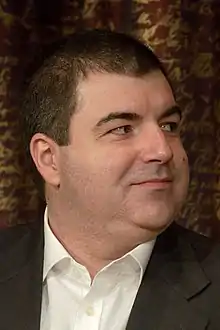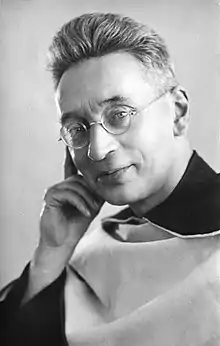Radboud University Nijmegen
Radboud University (abbreviated as RU, Dutch: Radboud Universiteit, formerly Katholieke Universiteit Nijmegen) is a public university with a strong focus on research located in Nijmegen, the Netherlands. The university bears the name of Saint Radboud, a 9th century Dutch bishop who was known for his intellect and support of the underprivileged.
Radboud Universiteit | |
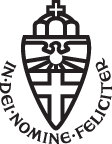 | |
| Latin: Universitas Radbodiana Noviomagensis | |
Former name | Catholic University of Nijmegen |
|---|---|
| Motto | In Dei nomine feliciter (Latin) |
Motto in English | Happily in the name of God |
| Type | Private; publicly funded |
| Established | 17 October 1923 |
| Rector | Han van Krieken |
Administrative staff | 2,735 [1] |
| Students | 22,976 (October 2019)[2] |
| Location | , , Netherlands |
| Campus | Urban |
| Colors | Carmine red[3] White |
| Affiliations | EUA FIUC/FUCE (IFCU) Guild of European Research-Intensive Universities |
| Website | www |
Established in 1923, Radboud University has consistently been included in the top 150 of universities in the world by four major university ranking tables. As of 2020, it ranks 105th in the Shanghai Academic Ranking of World Universities.[4] Internationally, RU is known for its strong research output. In 2019, 447 PhD degrees were awarded, and 7.571 scientific articles were published.[5] To bolster the international exchange of academic knowledge, Radboud University joined the Guild of European Research-Intensive Universities in 2016.
Located on a green campus in the southern Heyendaal neighbourhood of Nijmegen, the campus houses 7 faculties that conduct teaching and research in Arts, Law, Management, Medical Sciences, Social Sciences and Theology, Philosophy and Religious Studies. In addition to these faculties, the campus also hosts the Max Plank Institute for Psycholinguistics, a world class research centre devoted to the understanding of human language and communication.
Among its alumni Radboud University counts 12 Spinoza Prize laureates and 1 Nobel Prize laureate, Sir Konstantin Novoselov,[6] the discoverer of graphene. Other notable alumni include former Prime Minister of the Netherlands Dries van Agt, former chairman of Unilever Marijn Emmanuel Dekkers, influential priest and theologian Henri Nouwen, and First Vice-President of the European Commission Frans Timmermans. Former students have also won 3 Olympic medals since 2000 (all in rowing).
Coat of arms
Radboud University's coat of arms was designed at the time of the founding of the university by the goldsmith workshop of the Brom family in Utrecht. The lower part represents the coat of arms of the Catholic Church in the Netherlands. The dove in the upper part of the coat of arms is the symbol of the Holy Spirit. The entire shield is surmounted by the Imperial Crown of the Holy Roman Empire because Nijmegen was once home to Frankish King Charlemagne. Underneath the coat of arms one finds the university's motto "In Dei Nomine Feliciter",[7] meaning "happily in the name of God". The coat of arms is used on most of the university's official documents, including the university's bachelor, master and PhD certificates. For 2023 a special version of the coat of arms was designed to celebrate Radboud University's 100 year anniversary.
History
The first University of Nijmegen was founded in 1655 as the Kwartierlijke Academie van Nijmegen. Students developed their skills in the traditional fields of theology, medicine and law. Although the university had its successes, the Kwartierlijke Academie terminated around 1680. The university was unable to recover from successive outbreaks of the plague and the French invasion of the Netherlands in 1672.[8]
After several attempts to establish a new university in Nijmegen, the Radboud University Nijmegen was established in 1923 as the Katholieke Universiteit Nijmegen (Catholic University of Nijmegen). It was founded by the Saint Radboud Foundation, a network of bishops that wished to emancipate Catholic intellectuals in the Netherlands.[8] At the time, Dutch Roman Catholics were disadvantaged and occupied almost no higher posts in governmental and scientific institutions. The establishment of a university was seen as a possible stepping stone for these individuals.
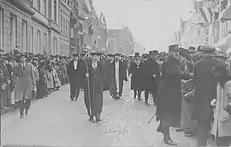
The first years after the establishment of 1923 were rather successful, but during the Second World War the young university was hit hard. Many prominent members were lost, among them professors Robert Regout and Titus Brandsma who opposed Nazi rule. They were deported to Dachau concentration camp and died there. Meanwhile, students of Dutch universities were prompted to sign declarations of loyalty to the Germans occupiers. Radboud's rector magnificus Bernard Hermesdorf, was the only rector in the Netherlands to refuse to have his students sign these declarations of loyalty.[8]
Classes resumed again in March 1945, when Nijmegen was freed. Because many university buildings had been bombed during the war, there existed a need for new facilities. In 1951, the Faculty of Medical Sciences was the first faculty to move to estate Heyendaal in the southern part of Nijmegen.[9] Soon, the university acquired more land in this area to house the others faculties as well. In 1988 all faculties had been moved to the new campus at Heyendaal. Since the end of the war, student numbers rose steadily from 3,000 in 1960 to 15,000 in 1980. As of October 2019, the university is host to 22,976 students, of whom 10,6% are international students.[10]
In 2004, the university decided to change its name from Catholic University of Nijmegen to the more inclusive name Radboud University Nijmegen, honoring Saint Radboud of Utrecht. In the following years, the university struggled with the interference of the Catholic Church. For years the Catholic bishops refused to accept appointments to the Radboud executive board by non-Catholic individuals. Per 15 November 2020, the Bishops' Conference of the Netherlands decided to revoke the designation Catholic from Radboud's supervisory body.,[11][12] meaning that the university is no longer entitled to present itself as Roman Catholic.
Faculties
Radboud University is organized in seven faculties that offer programmes and courses in the fields of humanities, social sciences, natural sciences, medical sciences, law, management, philosophy, theology and religious studies. Each faculty (cf., College in the USA or School in Europe) is a formal grouping of academic degree programmes, schools and institutes, discipline areas, research centres, and/or any combination of these drawn together for educational purposes.
- Faculty of Arts
- Faculty of Law
- Radboud University Medical Centre
- Nijmegen School of Management
- Faculty of Philosophy, Theology and Religious Studies
- Faculty of Science
- Faculty of Social Sciences
Campus
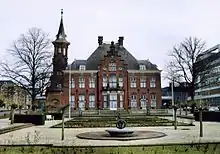
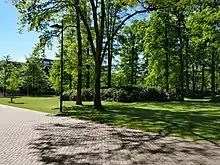
Featured prominently on the west side of the university's Heyendaal campus is the Heyendaal castle. It borders the Radboud University Medical Center, a large teaching hospital located on the campus, which is linked to the university's medical department. Bordering the university hospital is the Huygens Building, which houses the Faculty of Natural Sciences. The Erasmus Tower, which contains the Faculty of Arts, is situated at the south end of the campus next to the Radboud Sports Centre (RSC). The Erasmus Tower and the RSC border the Elinor Ostrom building, which is home to the School of Management and also encompasses the political sciences and economics faculty staff. On the other side of the Erasmus Tower, a number of general lecture halls are located along with the campus pub and bookshop. Beyond this area, one finds the modern Maria Montessori building, home to the Faculty of Social Sciences and the Grotius building, home to the Faculty of Law.
Radboud University is noted for its green campus, often listed among the most attractive in the Netherlands.[13][14]
The university is currently undertaking major efforts to renew and refresh its campus:
- The new law faculty was completed in 2014.
- A refurbishment of the Faculty of Dentistry building was completed in 2016.[15]
- The nearby Jesuit Berchmanianum monastery was purchased by the university in 2013. In 2018, it was connected to the rest of the campus. It now houses the university's general services staff and will serve as its auditorium.[16]
- The main Erasmus tower housing the Faculty of Arts and the university restaurant is currently being refurbished. That project is set for completion later in 2019.[17]
- The High Field Magnet Laboratory (HFML) and Free Electron Lasers for Infrared eXperiments (FELIX) laboratory]are set to be physically connected later in 2019.[18]
- Finally, a new Social Sciences Faculty building, to be named after Maria Montessori, is being finished in 2020 on the site of the Thomas van Aquinostraat.
In 2017, a SPAR minimarket was opened in the Erasmus building which provides students with snacks and accessories.[19] The university campus borders the campus of the HAN vocational university, which in turn is located next to Heyendaal train station. Frequent shuttle buses connect the university to Nijmegen Central Station and the city centre.
Academics
Education
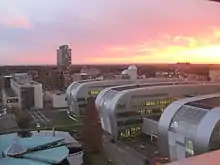
Radboud University has seven faculties and enrols over 22.000 students in 112 study programs (46 bachelor's and 75 master's programs).[20]
As of September 2019, the university offers 36 international master's programs taught in English and several more taught in Dutch. There are nine bachelor's programs taught fully in English: American Studies, Artificial Intelligence, Biology, Chemistry, Computing Science, International Economics & Business, International Business Administration, English Language and Culture, Philosophy, Politics and Society and Molecular Life Sciences. International Business Communication, History, Psychology and Arts and Culture Studies offer English-language tracks. All other bachelors are in Dutch, although most of the required literature is in English. Some exams, papers and even classes may be in English as well, despite the programs being Dutch-taught. All master's programs have been internationally accredited by the Accreditation Organization of the Netherlands and Flanders (NVAO).
International Master's programs
All English-taught Master's programmes are research-based programmes. They are taught within the Faculties of Arts, Law, Social Sciences, Medical Sciences, Sciences and Philosophy, Theology and Religious Studies, besides the Interfaculty Research school and the Nijmegen School of Management.[21]
Research
Radboud University is home to several research institutions, including the Business & Law Research Centre, Institute for Management Research, NanoLab Nijmegen, the Donders Institute for Brain, Cognition and Behaviour and HFML-FELIX. Faculty members Anne Cutler (1999), Henk Barendregt (2002), Peter Hagoort (2005), Theo Rasing (2008), Heino Falcke (2011), Mike Jetten (2012), Ieke Moerdijk (2012), Mikhail Katsnelson (2013), and Wilhelm Huck (2016) won the Spinoza Prize. Visiting professor Sir Andre Geim and former PhD student Sir Konstantin Novoselov were awarded the 2010 Nobel Prize in Physics.
University ranking
| University rankings | |
|---|---|
| Global – Overall | |
| ARWU World[22] | 101-150 (2020) |
| CWTS World[23] | 130 (2020) |
| QS World[24] | =214 (2021) |
| THE World[25] | =136 (2021) |
| USNWR Global[26] | =103 (2021) |
Radboud University has been named best broad university in the Netherlands for the past seven consecutive years.[27] The physics department is considered top tier. A recent accomplishment is its contribution to the first picture of a black hole.[28] The Faculty of Law is nationally unrivaled in its research in business and law,[29] and retains strong international ties with other prominent research institutions, such as Bologna, Nice and Oxford. The Faculty of Law's European Law School and Notarial Law departments are considered best in class in the Netherlands,[30][31] just as Political Sciences, Sociology and Theology programmes in their respective fields.[27]
Radboud Excellence Initiative
The Radboud Excellence Initiative was created with the dual purposes of attracting talents from every academic field to Radboud University while strengthening international bonds between universities worldwide. The initiative is a joint enterprise of both Radboud University and Radboud University Nijmegen Medical Center. It provides two routes by which a researcher may come to Radboud University. Promising researchers who have completed their doctorate between two and eight years earlier at the time of nomination may be nominated for a fellowship whereas those researchers who are more established in their discipline may be nominated for a professorship.[32]
Student Life
Student associations (1923-now)
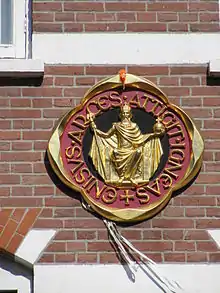
In 1923, when the Catholic University of Nijmegen was founded, every student automatically became part of student corporation Carolus Magnus, named after the Frankish king, Charlemagne, who used to reside in Nijmegen. This corporation was constructed to advocate for the needs of students and take care of the yearly initiation ceremony.. Carolus Magnus wished to attain the same status as other corporations in the well-known Dutch student cities of Leiden, Delft and Groningen. To the horror of the Catholic University’s management, it also pursued the same liberal elitist character as these other corporations. Still, Carolus Magnus continued developing and students eagerly participated. In the 1920s it produced its own sociëteiten: male students became part of Gentleman’s Society Roland (1928) and female students joined Lady’s Society Lumen Ducet (1929). Students of these sociëteiten that felt particularly close to each other united in smaller communities called disputen.
After the war student numbers at the Catholic University rose steadily, so did the number of disputen, sociëteiten and sport/cultural associations. In 1947, Rowing Association Phocas was founded and in 1957 Cultural Association Diogenes emerged. Umbrella organization Carolus Magnus became increasingly bloated and lost connection with the members of sociëteiten and disputen that began to operate more independently. In the 1960s Carolus Magnus received severe criticism. The student population had become more diverse, left-leaning and less elitist. The hippie movement had reached Nijmegen and many students wanted a more democratic student life. Carolus Magnus was not the beloved corporation it used to be and slowly became more concerned with administrative duties than organizing community activities. In 1966 Carolus Magnus ceased to exist in its traditional sense. From that moment on, students were free to choose which association they joined and which not.
In the 1980s and 1990s other kinds of student associations were established in Nijmegen, such as evangelical-christian association Navigators, and egalitarian association Ovum Novum. In 2005 Karpe Noktum emerged as the first alternative student association in Nijmegen.
| Student association | Date of establishment | Members | Type of association |
|---|---|---|---|
| N.S.V. Carolus Magnus | 1 februari 1928
(revival in 1973) |
600 | Traditional |
| N.S.R.V. Phocas | 1 May 1947 | 550 | Rowing-oriented |
| N.S.Z.V. De Loefbijter | 23 februari 1967 | 75 | Sailing-oriented |
| A.E.G.E.E. Nijmegen | 22 augustus 1986 | 85 | International |
| N.S.N. (Navigators) | 2 November 1989 | 215 | Evangelical |
| V.G.S.N. Thesaurum Quaeritans | 21 maart 1990 | 53 | Reformed (Liberated) |
| N.S.V. Ovum Novum | 20 May 1990 | 630 | Egalitarian |
| K.S.N. - Katholieke Studenten Nijmegen | 21 augustus 2000 | 23 | Catholic |
| A.S.V. Karpe Noktem | 7 December 2004 | 140 | Alternative |
| C.S.F.R. Quo Vadis | 27 oktober 2009 | 50 | Reformed |
Study associations
Lately study associations have overtaken part of the role that student associations like Carolus Magnus used to play, These study associations are related to individual degree programs and are open to international students as well. Study associations don’t have initiation rituals and regularly meet for fun-related, as well as study-related activities. Some examples of study associations are the study association for history students (Excallibur), the study association for psychology students (SPIN), and the study association for Business Administration students (Synergy).
Athletics
At the Radboud Sports Centre (RSC) students are welcome 7 days a week. During its opening hours students can choose between at least 80 different sports. In addition to the facilities of the Radboud Sports Centre, Radboud University also boasts more than 35 student sport clubs such as the Radboud Rangers (baseball), Obelix (rugby), Apelliotes (hockey) and FC Kunde (soccer). Phocas (rowing) and De Loefbijter (sailing) are by far the biggest sport clubs in Nijmegen. Next to their sport related activities, they also host several parties throughout the year.
Notable alumni
The following is a partial list of notable alumni of Radboud University:
Politics
- Dries van Agt (1955, LLM) - 46th Prime Minister of the Netherlands
- Louis Beel (1928, LLM) - 36th Prime Minister of the Netherlands
- Jo Cals (1940, LLM) - 41st Prime Minister of the Netherlands
- Ingrid van Engelshoven (1989, MSc) - Dutch Minister of Education, Culture and Science
- Thom de Graaf (1981, LLM) - former mayor of Nijmegen
- Loek Hermans (1976, MSc) - former Dutch Minister of Education, Culture and Science
- Agnes Kant (1989, MSc & 1997, PhD) - former leader of the Dutch Socialist Party
- Jos van der Lans (1981, MA) - former member of the Dutch House of Representatives
- Gerd Leers, (1976, MSc) - former mayor of Maastricht, Minister for Immigration and Asylum Affairs
- Victor Marijnen (1941,LLM) - 39th Prime Minister of the Netherlands
- Lilian Marijnissen (2006, BSc) leader of the Dutch Socialist Party
- Hans van Mierlo (1960, LLM) - former Dutch Minister of Foreign Affairs
- Frans Timmermans (1985, MA) - Dutch politician and diplomat who currently serves as the First Vice-President of the European Commission and the European Commissioner for the portfolio of Better Regulation, Inter-Institutional Relations, Rule of Law and Charter of Fundamental Rights in the Juncker Commission.
- Rita Verdonk (1983, MA) - former Dutch Minister for Immigration and Asylum Affairs, former member of the Dutch House of Representatives
Academics
- Anna Akhmanova (1999, PhD) - cell biologist and winner of the 2018 Spinoza Prize
- Wim Crusio (1984, PhD) - neurobehavioural geneticist
- Jos Engelen (1973, MSc & 1979, PhD) - experimental physicist
- Halleh Ghorashi (2001, PhD) - Iranian-born anthropologist, member of the Royal Netherlands Academy of Arts and Sciences
- Sir Konstantin Novoselov (PhD) - discoverer of graphene, awarded 2010 Nobel Prize in Physics
- Harald E.L. Prins (1976, BA) anthropologist, ethnohistorian, documentary filmmaker and expert witness on indigenous rights in United States and Canadian courts, distinguished Professor of Anthropology at Kansas State University.
- Frans de Waal (1970, MSc) - biologist and primatologist known for his work on the behavior and social intelligence of primates.
Business
- Marijn Dekkers, (1979, BSc) - Chief Executive Officer of Bayer (2010-2016) and Unilever (2016-2019)
- Aart Jan de Geus (1981, LMM) - Chief Executive Officer of the Bertelsmann Stiftung and chairman of the Triodos Bank
- Louis Reijtenbagh (1975, MSc) - founder and Chief Executive Officer of The Plaza Group
- Herna Verhagen, (1988, LLM) - Chief Executive Officer of PostNL, most influential Dutch woman in 2014
Other
- Godfried Bomans (1943, NC) - popular Dutch author, famous for his children fantasy novel "Eric in the Land of the Insects"
- A. F. Th. van der Heijden (1976, BA) - popular Dutch author, most known for his multi-novel saga De tandeloze tijd ("The Toothless Time")
- Karapet Karapetyan (2011, LLM) - Armenian-Dutch kickboxer, ranked #3 welterweight in the world by GLORY
- Björn Kuipers (2001, MSc) - football referee, leader of multiple UEFA Europa League finals and the 2014 UEFA Champions League Final
- Henri Nouwen (1964, MSc) - Catholic priest and writer, most known for his book "The Return of the Prodigal Son"
- Mark Retera (1989, MSc) - cartoonist, best known for his absurd gag comic DirkJan
Notable faculty
The following is a partial list of notable faculty of Radboud University:
- Hans van Abeelen, first Dutch behaviour geneticist
- Titus Brandsma, co-founder, murdered in Dachau concentration camp
- Ap Dijksterhuis, social psychologist and author of "Het slimme onbewuste"
- Heino Falcke, German professor of radio astronomy and astroparticle physics
- Carlos Gussenhoven, professor of linguistics, specializes in phonetics and phonology
- Catharina Halkes, first feminist theologian to be a professor in the Netherlands
- Mihai Netea, physician, awarded the Spinoza Prize of 2016
- Renate Loll, physicist, developed the theory of Causal Dynamical Triangulations.
- Jos van der Meer, professor of general internal medicine
- Cristina Pumplun, missionary vicar of the Westerkerk, Amsterdam
- Kees Versteegh, professor emeritus of Middle Eastern studies, also alumnus
- Roos Vonk, social psychologist and author of several popular scientific works such as "De eerste indruk" and "Je bent wat je doet"
- Jan van der Watt, expert in Johannine literature, General editor of Review of Biblical Literature
- Paul Bakker, controversial professor in medieval and renaissance philosophy
See also
- Hogeschool van Arnhem en Nijmegen, a University of Applied Sciences located in Nijmegen and Arnhem.
- List of early modern universities in Europe
- N.S.V. Carolus Magnus
Notes
References
- "Radboud University".
- "Facts & figures".
- "Colour". ru.nl.
- "Position in international rankings". Radboud University. Retrieved 19 July 2020.
- "Facts & figures". Radboud University. Retrieved 19 July 2020.
- "The Nobel Prize in Physics 2010". NobelPrize.org. Retrieved 19 July 2020.
- Judith van Beukering (red.) 80 jaar KU Nijmegen - 80 objecten. Tachtig jaar Katholieke Universiteit Nijmegen in voorwerpen van wetenschap, geschiedenis en kunst (Nijmegen 2003) 15.
- "Historie". Radboud Universiteit (in Dutch). Retrieved 19 July 2020.
- "Period of growth". Radboud University. Retrieved 20 July 2020.
- "RU Facts and Figures".
- "Stichting Katholieke Universiteit to lose its "Catholic" designation".
- "Decreet tot intrekking van het predicaat katholiek van de Stichting Katholieke Universiteit, statutair gevestigd te Nijmegen" (PDF).
- ingevoerd, Geen OWMS velden. "Green campus". Department of Property Management.
- "Facilities on the campus - Working at Radboud University". Ru.nl. Archived from the original on 10 September 2012. Retrieved 21 July 2013.
- ingevoerd, Geen OWMS velden. "Renovatie Tandheelkunde". Universitair Vastgoed Bedrijf.
- ingevoerd, Geen OWMS velden. "Berchmanianum". Department of Property Management.
- ingevoerd, Geen OWMS velden. "Erasmusgebouw and square". Department of Property Management.
- ingevoerd, Geen OWMS velden. "Connection between HFML and FELIX". Department of Property Management.
- "SPAR | SPAR University RU Nijmegen". www.spar.nl. Retrieved 15 March 2018.
- "Internal Server Error" (PDF).
- "Overview of Master's programmes and specialisations". Archived from the original on 24 June 2013.
- "Academic Ranking of World Universities 2020". ShanghaiRanking. Retrieved 20 December 2020.
- "CWTS Leiden Ranking 2019". Retrieved 5 October 2019.
- "QS World University Rankings 2020". Top Universities. 15 July 2019.
- "World University Rankings 2021". Times Higher Education (THE). Retrieved 20 December 2020.
- "Best Global Universities Rankings (2021)". U.S. News Education. Retrieved 20 December 2020.
- ingevoerd, Geen OWMS velden. "Keuzegids 2019: Radboud opnieuw beste brede, klassieke universiteit". Radboud Universiteit.
- "Dit is de allereerste foto van (de schaduw van) een zwart gat". NRC.
- ingevoerd, Geen OWMS velden. "Onderzoeksmaster Onderneming & Recht en master Nederlands recht nummer 1 in Keuzegids". Faculteit der Rechtsgeleerdheid.
- ingevoerd, Geen OWMS velden. "Bachelor Notarieel Recht". Radboud Universiteit.
- ingevoerd, Geen OWMS velden. "Bachelor European Law School". Radboud Universiteit.
- "What is the Radboud Excellence Initiative?". Radboud University Nijmegen. Retrieved 2 June 2018.

_Hearing_of_Frans_Timmermans_(the_Netherlands)_-_Executive_Vice_President-Designate_-_European_Green_Deal_(48866429362)_(cropped).jpg.webp)
.jpg.webp)
